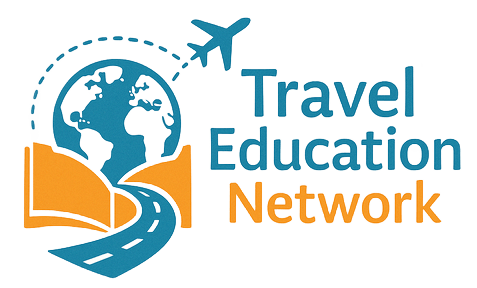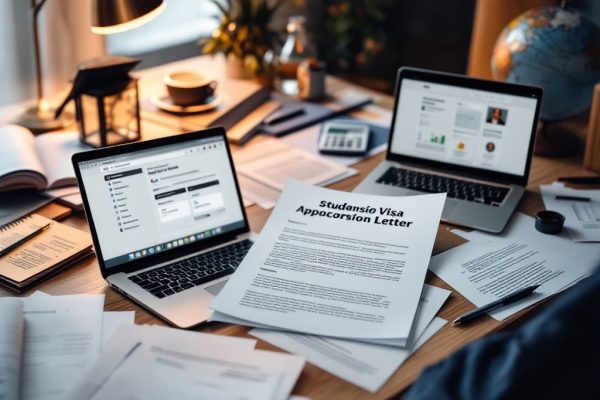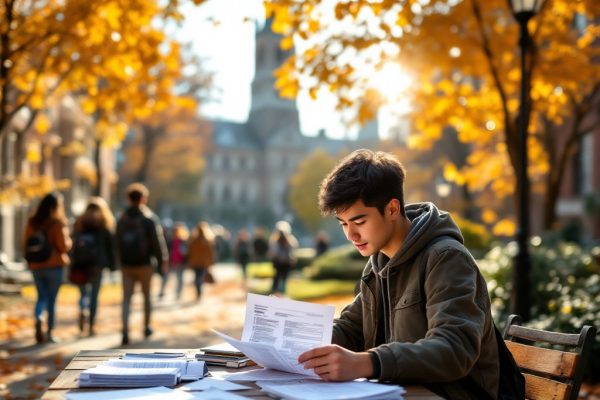How to Get a Visa to Study Abroad: Country-Wise Rules and Tips
Dreaming of studying abroad? Securing a student visa is your first step. This essential document grants you legal entry to your chosen country for education, and requirements vary based on your nationality and destination. This comprehensive guide outlines everything you need to know, from visa types and application procedures to common pitfalls and troubleshooting tips. Start your journey the right way – learn how to navigate the visa process efficiently and ensure your international study dreams become a reality. Read on to unlock your global education potential.
Important information

- A student visa is required for most extended study abroad programs (typically over 90 days). Contact your host country’s embassy or consulate for specific requirements.
- Visa requirements vary based on your nationality and the host country. Research the specific regulations early in the application process.
- Gather essential documents like a valid passport, acceptance letter, proof of funds, and health insurance. Check the embassy website for a complete list.
- Start the visa application process as soon as your study placement is confirmed to account for processing times and potential delays.
- Consult with an education abroad advisor for guidance and support throughout the visa application process.
Understanding the Need for a Student Visa to Study Abroad
Planning to study abroad? A student visa is essential for extended stays. This official document grants you permission to enter a foreign country for educational purposes, given you have a confirmed place at an approved institution. While short visits may not require a visa, stays exceeding 90 days generally do. Visa requirements differ depending on your nationality and the host country. For example, US citizens studying in Ireland can often bypass the interview process. However, other nationalities might encounter stricter regulations, involving extensive documentation and consulate appointments. For accurate information, connect with the embassy or consulate of your chosen country immediately after receiving your study placement confirmation.
Visa Requirements Vary
Visa regulations depend on your citizenship and destination. Contact the embassy or consulate of your host country for specific details.
Start Early
Begin the visa application process as soon as your study placement is confirmed. Early preparation ensures a smooth transition to your international studies.
What is a Student Visa?
A student visa allows foreign citizens to reside in a country for their studies. It’s a non-immigrant visa, precluding permanent work and residency. Applications are submitted through the chosen country’s embassy or consulate before travel.
Why International Students Need a Visa
A visa grants entry to a foreign country, often for a specific purpose like studying. Student visas are issued to those accepted into recognized educational institutions. However, not all countries mandate a visa; some have reciprocal agreements waiving this requirement. To determine the specific regulations, consult the destination country’s embassy or consulate. Your passport is indispensable for any visa application and must be submitted alongside your other materials.
Common Visa Categories for Students
The F-1 visa caters to academic students at all levels, from elementary school to university. It also applies to other academic institutions like seminaries, conservatories, and language training programs.
The J-1 visa is designed for exchange visitors participating in work and study-based exchange programs.
The M-1 visa covers vocational students pursuing non-academic training, such as technical school.
Country-Specific Visa Requirements for Studying Abroad
Planning to study abroad? You’ll likely need a visa, and the process depends on your destination. Some countries require a consulate interview, while others don’t. Required documents, such as financial statements or medical exams, also differ. Thoroughly research your host country’s specific regulations on the embassy or consulate website. Education abroad advisors and visa processing services can also help.
Research your host country’s visa requirements. Visit the embassy or consulate website for the most accurate details.
Check if a consulate interview is required for your destination. Some countries require it, while others don’t.
Gather the necessary documents. These may include financial statements, medical exams, and other specific paperwork.
Seek assistance if needed. Education abroad advisors and visa processing services can provide valuable support.
How Visa Requirements Vary by Country
Applying for a student visa involves several key aspects. Your nationality and destination country significantly influence the specific requirements. Generally, you’ll need to gather various documents, provide proof of financial stability, and potentially submit language test scores. An interview may also be part of the process. Some countries mandate obtaining a visa before arrival, while others issue visas upon arrival. Permitted lengths of stay also differ. Some visas restrict your stay to the duration of your course, while others grant additional time for internships or job seeking. To ensure a smooth application process, thoroughly research the specific regulations of your host country through their embassy, consulate, or official government website. This proactive approach will help you avoid potential issues.
Checking Official Embassy Websites for Accurate Information
To get the latest visa information, start with the official embassy website. It’s an invaluable resource offering detailed instructions, downloadable forms, and contact information. This ensures accuracy, boosting your chances of a successful application and avoiding delays.
Understanding Entry and Exit Requirements
Planning a trip? Don’t forget to check your destination’s entry requirements. Some countries require visas, which you may need to obtain before departure or sometimes upon arrival. Visa regulations often specify entry and exit procedures. For the most reliable information, consult the official embassy website of your destination country.
The Student Visa Application Process
Determine the appropriate visa category based on your program and destination.
Compile essential documents, including proof of enrollment, financial documentation, and a valid passport.
Submit your application online or in person, following the embassy or consulate’s guidelines.
An interview may be required.
Processing times can range from weeks to months, depending on the specific country and individual circumstances.
Upon approval, carefully review your visa for accuracy, noting the dates and any conditions before traveling.
To avoid complications, begin the application process well in advance of your departure, allowing ample time for potential delays.
Step-by-Step Guide to Applying for a Student Visa
Locate the nearest consulate and thoroughly review their website for specific instructions.
Gather the necessary documents, including a visa application, your passport, and acceptance documentation from your school. Refer to the consulate’s website for a complete list of required documents.
Pay the applicable visa processing fee, which may vary depending on the country.
Wait for your visa to be delivered by mail. Processing times can take several weeks, so plan accordingly.
Understanding Visa Application Forms and Processing Fees
Provide accurate and complete details about your background, qualifications, and intended studies.
Pay a non-refundable processing fee, which varies depending on your country and the type of visa.
Submit financial documentation demonstrating you can cover your tuition and living costs.
Essential Documents for a Successful Visa Application
Start with a valid passport and your school’s acceptance letter.
Demonstrate financial stability with proof of funds and health insurance coverage.
Prepare academic transcripts and language test scores if necessary.
Depending on your destination, a medical check-up or police clearance might be required.
Complete the visa application form and include passport photos.
Provide bank statements as proof of financial resources.
In some cases, proof of accommodation and a prepaid return envelope are also needed.
Always double-check the specific requirements on the embassy website.
Proof of Enrollment and Acceptance Letters
To apply, you will need documentation confirming your enrollment and acceptance into your chosen program. These documents should clearly outline your course of study and program duration. Acceptable examples include an official acceptance letter, enrollment confirmation, or a current school transcript. However, be aware that certain countries may demand specific forms or certifications. Always consult the relevant embassy website for the most current requirements.
Gather your enrollment documentation. This includes your official acceptance letter, enrollment confirmation, or current school transcript.
Ensure your documents clearly show your course of study and program duration.
Check the specific requirements of the country you are applying to. Some countries may require specific forms or certifications.
Consult the relevant embassy website for the most up-to-date information.
Providing Financial Documentation and Proof of Funds
Gather your financial documentation. This includes bank statements, scholarship awards, or sponsorship letters demonstrating your ability to cover tuition, living expenses, and return travel.
Contact your chosen institution directly. Each institution has its own specific requirements and deadlines for financial documentation.
Inquire about specific forms. Your chosen school may require particular forms for financial documentation.
Medical and Travel Insurance Requirements
Travel insurance requirements depend on your destination. For specific details, contact the embassy or consulate of the country you are visiting. Student visas often require special insurance, typically covering medical expenses, repatriation, and trip interruptions. Always consult official government websites for the most current information. These resources may list approved providers and outline minimum coverage requirements.
Before Your Trip
- Research your destination’s specific travel insurance requirements.
- Contact the embassy or consulate for detailed information.
- If you are a student, check the insurance requirements for your visa.
Finding Reliable Information
- Consult official government websites for up-to-date details.
- Look for lists of approved insurance providers.
- Check the minimum coverage requirements for your trip.
Language Proficiency Proof: When is it Needed?
Applying to a program in a foreign language often requires demonstrating proficiency through tests like IELTS or TOEFL. Some institutions, however, may waive this if you have prior experience studying in that language. Additionally, individual programs might have unique requirements, so it’s always best to confirm directly with the institution. A clear understanding of these requirements streamlines the application process.
Biometrics and Visa Interviews: What to Expect
Biometric data, such as fingerprints and a photograph, are typically collected to verify your identity. Embassies may also conduct an interview to assess your intentions and confirm your student visa eligibility. During this interview, visa officers will review your application to ensure its accuracy.
Planning for Visa Processing Time and Potential Delays
Visa processing times can vary significantly, ranging from a few days to several months depending on the country you’re visiting and your individual situation. For the most current processing times, it’s essential to contact the embassy or consulate responsible for handling your visa application. To avoid potential delays that could impact your study abroad program, it’s highly recommended to start the visa application process as early as possible.
Confirm your study abroad program.
Gather all required documents for your visa application.
Contact the relevant embassy or consulate to understand their specific procedures and estimated processing times.
Be aware that delays can sometimes occur due to limited appointment availability or unforeseen issues with your application documents. If you encounter any difficulties during the visa process, don’t hesitate to seek assistance from resources such as study abroad advisors, international student support services, or your university.
Understanding Visa Processing Timeframes
Visa processing times can vary significantly, ranging from a few days to several months. This timeframe depends on several factors, including your nationality, individual circumstances, consulate workloads, and appointment availability. To prevent potential delays, it is recommended to initiate your visa application up to 90 days prior to your intended travel date. For the most precise processing time estimate and guidance on the appropriate application location, contacting the relevant embassy or consulate directly is advised.
How to Anticipate and Manage Potential Delays
Monitor visa processing times on the embassy’s website and apply months in advance if possible. Because delays can happen, it’s recommended to have a backup plan and be flexible with your travel dates. For updates, contact the embassy or consulate, but be prepared to submit additional documentation if necessary.
Tips for a Successful Student Visa Application
Contact your consulate for their specific visa application guidelines, which may include an in-person interview.
Demonstrate your financial stability by providing documentation such as bank statements, scholarship letters, or financial aid awards to prove you can cover tuition and living expenses.
Leverage the expertise of your university’s education abroad advisors for invaluable support and simplification of the visa process.
Importance of Consulate Procedures and In-Person Interviews
Visa requirements depend on your nationality and the type of visa you are applying for. Students may need an interview. Contact your local consulate for specific details. Book an appointment in advance, as they are often required. While visa services can sometimes help, always confirm all requirements with the consulate directly to ensure accuracy.
How to Ensure You Have Sufficient Funds and Financial Aid
Demonstrate your financial capacity to cover tuition and living expenses by providing the following:
- bank statements,
- scholarship awards,
- sponsorship agreements.
Financial aid can supplement your resources. Consider these options:
- scholarships,
- grants,
- loans.
Explore university aid and external funding opportunities. Combining your personal funds with financial assistance confirms your ability to meet educational costs.
Expert Guidance from Education Abroad Advisers
Planning to study abroad? Navigating the visa application process can be overwhelming. A study abroad advisor can be your greatest ally, simplifying the complexities and ensuring a smooth experience. Here’s how they can help:
Document Guidance
Study abroad advisors can guide you in gathering the necessary documents for your visa application. They provide clarity on required paperwork, ensuring you have everything you need for a successful submission.
Country-Specific Regulations
Visa regulations vary significantly between countries. Advisors are knowledgeable about these specific requirements, helping you navigate the complexities of your chosen destination.
Language Proficiency
Many countries require proof of language proficiency. Your advisor can explain the necessary tests and scores, and assist with the application process.
Financial Documentation
Understanding and providing the correct financial documentation can be confusing. Advisors can clarify these requirements and ensure you submit the appropriate paperwork.
Problem Solving
Unexpected problems can arise during the visa process, such as needing an extension. Advisors offer valuable support and guidance should any issues occur.
Early Consultation
For a seamless visa application process, consult a study abroad advisor early in your planning. This proactive approach allows ample time to address any challenges and ensures a smooth journey.
Handling Visa Extensions and Emergency Applications
Visa Extension
Extending your visa involves following your host country’s specific regulations. Contact their immigration office or your school’s international student office for help with the required forms and documentation. They can guide you through the application process.
Visa Emergencies
Visa emergencies can happen, and expedited processing might be possible. Start by reviewing the consulate’s website for details on emergency procedures and required documents, such as medical records or family crisis details. Contacting the consulate directly lets you explain your situation and explore available options. They can offer specific guidance for your circumstances.
How to Apply for a Visa Extension
Extending your visa involves several key steps. First, contact your host country’s embassy or consulate for specific instructions. They can provide details on the required documents and procedures. Second, gather all essential documents, including a valid passport, your current visa, proof of enrollment or employment, and financial documentation. Third, submit your complete application before your current visa expires. Processing times can vary, so apply in advance to avoid any issues.
Emergency Visa Application Procedures
Need a visa quickly? Contact the nearest consulate or embassy immediately. They can sometimes expedite visas for emergencies. It is recommended to check their website first, as each consulate operates under its own specific rules and procedures, which are detailed online.
Common Issues and Troubleshooting Visa Applications
Ensure your visa application is complete and accurate, including proof of sufficient funds, to avoid common pitfalls.
Thoroughly research each country’s specific visa requirements for a hassle-free experience.
Prepare your documents in advance and meet all deadlines.
If an interview is required, practice your responses and articulate your study plans clearly.
Should any issues arise, promptly contact the consulate or your advisor.
A visa rejection isn’t the end; understand the reasons and consider appealing or reapplying.
Your advisor or a consular group can provide valuable assistance.
How to Avoid Common Visa Application Mistakes
Steer clear of common visa application pitfalls. Many rejections stem from simple oversights, such as:
- incomplete forms,
- inaccurate information,
- insufficient financial documentation.
Remember each country’s unique regulations.
Craft a thorough and precise application. Include all necessary financial and supporting materials, double-checking every detail. Consult these resources for valuable guidance:
- Your destination country’s embassy or consulate website,
- your educational advisor.
What to Do in Case of Visa Rejections and Appeals
Carefully review your denial letter to understand the specific reasons for your visa rejection. Common issues include insufficient financial documentation or unconvincing ties to your home country.
Gather additional documents to directly address the concerns raised in the denial letter.
If your country offers an appeals process, pursue it.
Reapply for the visa if you can demonstrate that you now meet all the requirements.
Consult an immigration expert for guidance.
Contact the consulate or embassy for assistance.
Reach out to your educational advisor if challenges persist.


















